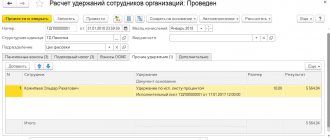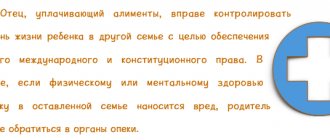Procedural features of collection
If the court has made a decision on the need to transfer alimony payments, then several options are possible:
- The magistrate's court issues a court order, on the basis of which a certain percentage will be withheld from the payer's pension for the maintenance of minor children: 25% for one, 33% for two, 50% for three or more children. Withholding will be carried out if the debtor refuses to transfer alimony on a voluntary basis. According to the norms of the RF IC, the amount of alimony for minors as a percentage can be changed taking into account the financial situation of the parties.
- The plaintiff has the right to go to court and receive alimony in a fixed amount, which must be paid from all income of the debtor, including pensions. If alimony is collected for a minor child, then this is possible in the case when the debtor does not have a permanent income, except for a small pension, and he is hiding from fulfilling his parental responsibilities. The establishment of alimony in a fixed amount is carried out exclusively on the basis of a statement of claim.
- If a relative, a member of the pensioner’s family, filed a claim for alimony support, then payments are awarded in a fixed amount and must be transferred monthly. For example, an elderly mother can file a claim against her son, a recipient of a military pension. Then, in the absence of other income or taking it into account, alimony will be provided from the pension.
Alimony payments from pensions will be withheld in accordance with the general procedure.
When a court order is made, a lien will be held against the pension fund. He can deduct 25% or more from the pension at the request of the claimant - usually the other parent of a minor child. If the debtor stubbornly refuses to fulfill his obligations, then alimony will be withheld from the pension by order of the bailiff. This is possible when the recipient contacts the bailiffs with an application to begin enforcement proceedings. The debtor's bank card may be blocked by order of the bailiff. Up to 70% of the pension will be withheld against the debt. Enforcement of social payments is limited, but this rule does not apply to most pensions.
If there is arrears of alimony and (or) other debts, the bailiff considers the pension as the income of the payer, from which appropriate payments are possible.
Responsibility for non-payment of alimony
Since the maintenance of children until they reach adulthood is the direct responsibility of the father and mother, responsibility is provided for by law for those negligent parents who neglect their duty.
At the same time, as statistics show, the majority of alimony providers try in every possible way to escape the obligation to support children: they hide their income, place of work, and sometimes even try to hide themselves.
To prevent such situations, bailiffs interact with law enforcement agencies and the Pension Fund, including on issues of establishing the volume of the defaulter’s property, the amount of income actually received by him, searching for the debtor and bringing him to justice.
If payment is late, the payer may be subject to penalties for late fulfillment of the obligation - for each day 0.5% of the debt amount.
According to Part 2 of Art. 114 of the RF IC, the alimony holder has the right to apply to the court with a request to exempt him from paying arrears of alimony for reasons such as illness, difficult financial or family circumstances.
In addition to bringing to civil or administrative liability, in some cases it is possible to bring to criminal liability.
According to Art. 157 of the Criminal Code of the Russian Federation, failure to pay funds for the maintenance of children may result in punishment in the form of imprisonment for a term of up to one year. Under this article, less stringent measures may also be applied, such as correctional or forced labor for up to one year or arrest.
Of course, in life there are all sorts of situations: loss of income, dismissal, moving, illness. In each case, first of all, it is necessary to establish the reasons why the court decision is not implemented, and also to understand whether the payer had intent or the non-payment occurred due to some circumstances that he could not control.
Be that as it may, you should not let the situation take its course. If circumstances arise in life due to which it is not possible to make payments on time, it is better to contact the SSP with a corresponding application. In addition, you can go to court with a claim to reduce the amount of alimony, properly justifying such a requirement.
In addition to prosecution, ignoring the obligations to execute a court decision can also lead to such unfavorable consequences as putting a person on the wanted list, restricting the right to travel abroad, and in addition, lead to deprivation of parental rights.
Registration of alimony agreement
If citizens decide not to bring the dispute to court, then they can draw up an alimony agreement, under which payments can be made from the payer’s pension and (or) other permanent income. It must be executed by a notary. The amount of payments under such an agreement does not violate the interests of minor recipients and other persons whom the pensioner is legally obligated to support.
In the alimony agreement, taking into account the norms of Art. 97-101 RF IC, you will need to indicate the following points:
- date and place of execution of the document;
- information about the alimony payer - full name, passport details, actual location address;
- information about the recipient of payments - his full name, passport details;
- an amount that will be provided in a fixed form. The RF IC does not prohibit, in addition to payments in a fixed amount, the establishment of an additional amount of maintenance in kind. As alimony security, you can transfer property, including securities and natural products.
Important! The parties must agree on the procedure for indexing alimony. If there is no such agreement, then indexation can be carried out in court and upon application to the bailiff.
In the agreement, you can agree on the period for providing alimony. They can be transferred at any time established by the parties: every month, every 2-3 months, etc. Amendments to the agreement are possible only in notarial form. Unilateral refusal to fulfill the alimony agreement is not allowed. A transaction can be terminated in court if it violates the interests of one of the parties.
How is collection carried out?
The first step for forced collection will be the execution of a writ of execution. With voluntary consent, such a document will become an agreement of the parties; after the court hearing, you need to obtain a writ of execution from the court office.
The case is heard in the magistrate's court at the applicant's place of residence. If a claim for an increase or recovery of payments is brought by a parent and a child, the case will be heard in the court closest to them, and the alimony provider must regularly attend meetings. Further, when a decision is made in favor of a minor, there are two options for the development of events.
Appeal to bailiffs
Application for calculation of alimony debt
The simplest and in most cases effective method. An appeal to the bailiffs removes all questions from the other side and transfers the solution of the alimony issue to the state. The bailiffs, having a writ of execution in their hands, will carry out forced collection from the pension and other official sources of income of the alimony worker without any special difficulties.
Important! Bailiffs, checking the money in the accounts of the defaulter, have the right to seize and write them off. Even if this particular payment is not considered taxable alimony income. To get the money back, you must file a complaint with a certificate from the Pension Fund, which will indicate the targeted transfer of funds.
In a situation where a pensioner works unofficially, hiding income, bailiffs have the right to take additional administrative measures, up to and including re-submitting the case to court. The actions of bailiffs are regulated by Article 101 of Law No. 229-FZ.
Direct appeal to the Pension Fund
If a parent or guardian providing for a child does not want to resolve the issue through the bailiffs for personal reasons, he can apply directly to the Pension Fund or any other fund that pays the child support. This applies to all organizations operating within the legal framework of the legislation of the Russian Federation.
If a parent or guardian providing for a child does not want to resolve the issue through the bailiffs for personal reasons, he can contact the Pension Fund directly
After the application, supported by a writ of execution or agreement, the fund is obliged to recalculate the amount of payments and transfer them to the applicant automatically, to the specified account. In this case, it is impossible to evade payments - the alimony provider simply does not participate in the procedure for transferring money, and it will not be possible to hide the amount of the pension.
Does a pensioner need to pay alimony?
For those paying financial assistance to their children, the question of whether it is necessary to pay alimony from an old-age pension remains relevant.
The list of income that can become the basis for calculating and withholding child support has been established by the government of the Russian Federation.
This list is given in Resolution No. 841 of 1996, it indicates pension payments among other income from which alimony is withheld.
In addition to the old-age pension, there are other pensions from which alimony payments must be withheld:
- Disability pension.
- Pension for military personnel and military veterans.
- Pension of employees of the Ministry of Internal Affairs and employees of other departments.
Deduction of alimony payments is carried out from pensions, bonuses to them, compensation amounts and indexation of pension payments.
For the maintenance of a child under 18 years of age, alimony must be paid to a spouse who has retired and due to length of service, a parent who has a disability or has simply reached the appropriate age.
Who has the right to collect alimony from a pension?
According to the RF IC, alimony may be collected for the maintenance of the following categories of citizens:
- spouses and former spouses;
- minor children;
- adult disabled children;
- parents;
- grandparents;
- stepfathers and stepmothers;
- brothers and sisters.
Collection of alimony is carried out in three ways: by concluding an alimony agreement with a notary, by way of claim or writ proceedings.
If we are talking about withholding payments to parents and other relatives, the funds are recovered only through legal proceedings or execution of an agreement.
What is alimony
Family law under alimony requires financial support from a family member if he does not fulfill this obligation provided by law on a voluntary basis. Maintenance can be recovered, including from a former family member, if we are talking about spouses who have terminated their marital relationship.
Such payments may be withheld from a pensioner to help the following persons:
- spouse or former spouse;
- a minor child;
- a child over 18 years old, but due to objective circumstances, does not have the opportunity to work and provide for himself;
- mother or father of adult adult children;
- grandparents, if they raised their grandchildren instead of their parents;
- other relatives, provided that they were dependent on the persons from whom alimony was being collected.
Reference! Funds are collected for the current maintenance of a person so that he can ensure his existence. For minor children, such payments are collected upon request unconditionally. For other relatives, it is necessary to prove that their current financial situation does not allow them to provide for themselves, as well as the impossibility of employment.
For the children of a person who does not live with them, funds can also be claimed if it is necessary to incur large one-time expenses. These may include undergoing treatment, purchasing the necessary equipment (for example, a musical instrument if the child plays music), purchasing a trip ticket for health purposes, etc.
Voluntary provision of maintenance is not considered by law as alimony . The latter can be recovered from a person on the basis of a court order, decision and a writ of execution issued on its basis, as well as a notarized agreement on the payment of alimony.
How to apply for alimony for a pensioner
Depending on how his retired father feels about supporting his child, there are two options for receiving alimony from him.
With voluntary consent
When there is a voluntary agreement to support the child on the part of his father, and the amount of such assistance is regulated between the parents (legal representatives), an agreement on the payment of alimony can be drawn up.
This document is drawn up in writing, signed by the parties and certified by a notary. If the father of the child fails to fulfill his obligation, the mother (guardian) has the right to forcibly collect maintenance. To do this, the agreement or its notarized copy is presented to the bailiff service for execution. It is a type of executive document and has the force of a court decision.
Important! Failure to comply with the conditions of mandatory notarization deprives the child’s mother of the right to receive alimony by presenting an agreement for forced collection, bypassing court proceedings.
If the retired husband refuses to help the child financially
When a pensioner categorically refuses to help his child financially, he needs to collect documents and go to court. In order for the application to be accepted and considered, the mother (guardian or trustee) must attach to it:
- copy of passport;
- a copy of the document on guardianship or guardianship (if it is not the child’s natural mother who is applying for alimony);
- child's birth certificate;
- certificate of registration or divorce;
- certificate of dependency and cohabitation with the child.
The application itself must indicate that the debtor receives income in the form of a pension. It is not necessary to attach a certificate of its size. Her court will ask the father of the child or independently.
Important! If an application for a court order is submitted in person to the court office, the claimant must keep one copy of it with an acceptance stamp.
Sometimes in practice there are cases when a retired father, in order to extend the time of non-payment of child support, files objections to the court order to collect them. In this case, the claimant must draw up a statement of claim for the recovery of alimony and submit it to the same court. The same documents are attached to it as to the application for the issuance of a court order. As a result, the court will collect the maintenance from the date of the initial application for it (Part 11 of the Resolution of the Plenum of the Supreme Court of the Russian Federation No. 56 of December 26, 2017).
Judicial practice in cases of alimony collection
When courts consider claims for the collection of alimony from pensioners, the judicial practice that has developed in this category of cases also plays an important role. In particular, when considering this category of cases, the courts are guided by the provisions of the Resolution of the Plenum of the Supreme Court of the Russian Federation dated December 26, 2021 No. 56 “On the application by courts of legislation when considering cases related to the collection of alimony.”
When resolving this category of cases, courts must not only necessarily establish the financial and marital status of the parties, but are also obliged to take into account any other circumstances that have an impact on the resolution of the dispute.
Considerable difficulties in judicial practice are caused by the issue of proving the financial situation and sufficient income of the defendant. The established practice in resolving such disputes shows that in cases of alimony collection there are often cases when the officially confirmed level of income does not correspond to the actual income of a person, including this occurs in cases where salaries are paid “in envelopes”.
When considering issues of bringing to responsibility for non-execution of decisions on the collection of alimony, courts should find out the reasons why the decision was not executed, and also establish the presence or absence of intent in its non-execution.
Amount of alimony charged
The amount of alimony collected from the pension is established by family law and depends on the number of children who need to be financially supported.
In addition, the law gives parents the right to independently agree on how much money will be paid to the child monthly. In this case, payments can be assigned in the form of:
- a certain share of income;
- in a fixed amount (when the parent does not have a regular fixed income);
- mixed (one part of the alimony is paid as a percentage of the pension, the other - in a fixed amount).
If the father or mother who must pay child support does not work, the amount of payments will depend on the cost of living in the region.
For one child
According to Part 1 of Art. 81 of the RF IC , if maintenance obligations have arisen in relation to one child, 25% of the pension , regardless of its size.
For two children
If there are two minor children, the pensioner will part with 33% of his income monthly.
For three children or more
If there are three minors or more children, the parent will be charged 50% of his income .
Under certain circumstances this value can be increased to 70%:
-if there is arrears of alimony;
-a parent has child support obligations for three or more children, one of whom is disabled.
Reducing alimony
There are several situations on the basis of which the court can make a decision to reduce the amount of alimony payments to disabled people:
- High costs for medicines and medical procedures.
- Change in financial or marital status.
- The child has other sources of income that fully satisfy his needs.
- The parent with whom the child lives has acquired property or real estate that brings constant income.
- The emergence of new alimony obligations among disabled people.
- High payer income. If the percentage of income is a very large amount, which significantly exceeds the child's needs.
Calculation of the amount of alimony from a pension
In accordance with the legislation, which is also in force in 2021, only the court and bailiffs have the right to determine the amount of alimony and consider the income of a pensioner.
By its decision, the court determines not only the amount of payments, but also the health status of the payer and his financial situation.
Deductions are collected from all types and types of income of a pensioner:
- social benefits;
- social help;
- the pension itself;
- wages if the pensioner continues to work;
- compensation;
- vacation pay;
- other material deductions.
The law determines the amount and procedure for collecting alimony from a pension, taking into account the interests of both parties.
It is important to understand that it is very rarely possible to recover 70% or more of his income from a pensioner. There are very few such cases. Usually a maximum of 50% is retained and this is under certain conditions.
When calculating alimony payments from a pension, the financial situation of the pensioner and his financial capabilities are always taken into account.
If the payer can prove in court that he does not have enough funds for a normal existence, then the court may reduce the amount of alimony, and in certain cases, cancel it altogether.
In addition, it should be understood that child support is not a means of providing a luxurious life for a child or his parent who cares for him.
The purpose of alimony payments is to allow the child to live in primary conditions, as if he were living in a full-fledged family.
Reducing alimony
There are several situations on the basis of which the court can make a decision to reduce the amount of alimony payments to disabled people:
- High costs for medicines and medical procedures.
- Change in financial or marital status.
- The child has other sources of income that fully satisfy his needs.
- The parent with whom the child lives has acquired property or real estate that brings constant income.
- The emergence of new alimony obligations among disabled people.
- High payer income. If the percentage of income is a very large amount, which significantly exceeds the child's needs.
Grounds for reducing alimony from pension
The amount of payments for children is reduced when payers file claims on the following grounds:
- difficult financial situation;
- disability and need for regular purchase of medications;
- the appearance of other dependents for whom alimony has to be paid.
A reduction in the amount of alimony is allowed only by a court decision on a counterclaim or presentation of an objection by the defendant. It is also possible to reduce payments after the payment has been assigned by filing a claim.
Maximum amount of alimony
The maximum amount of voluntarily paid alimony is not limited in any way. The parent can pay any amount for the child that he wishes.
There is no upper limit for the amount of alimony collected in a specific amount. If the parent who has children proves that exactly this amount of money is required for the normal life and development of the child, it will be awarded, but within 70% of the income.
Correction factors
As mentioned earlier, the amount of alimony paid in a fixed amount depends on the cost of living established in a particular region. As it increases, the amount of payments is indexed and grows proportionally.
Collection procedure
To collect alimony from a disabled person, you must submit the following list of documents:
- Application for collection of alimony.
- A copy of the marriage or divorce certificate.
- A copy of the child's birth document.
- An extract from the house register, which confirms the fact that the plaintiff lives with the child.
- Document from the defendant’s place of work, if he is employed.
If the payer makes timely alimony payments, then no special difficulties arise when alimony is collected from the pension.
The parent with whom the child lives files a claim and the court determines the amount of funds that can be deducted from the pensioner.
The bailiffs report the court decision to the pension fund department. The court also makes notes and starting next month, the amount established by the court will be transferred to the account or card of the alimony recipient.
To begin the process of withholding alimony from a pension, you must have a court decision and a writ of execution. They can be issued and certified by Arbitration Courts or ordinary courts. You will also need a court order on the possibility of foreclosure.
All work regarding the collection of alimony payments is carried out by bailiffs .
It is their responsibility to ensure that no debt arises. If necessary, they negotiate with the defaulter and submit documents to the court to foreclose on the property.
The applicant is only required to submit a court decision and personal documents.
Is it possible to reduce the size
With regard to the maintenance of minor children, the law expressly provides that the amounts established as a general rule can be reduced, but only in the presence of exceptional circumstances.
Among them, the Supreme Court of the Russian Federation lists the following:
- the presence of other persons as dependents of the obligated citizen, in particular the need for him to support his other minor children;
- a citizen’s small income, in which, after paying alimony, he has no funds left for his own life (in this case, evidence must be presented to the court that in this way the person is not trying to hide official income);
- the advanced age of the payer or the deterioration of his health;
- in other cases of deterioration in the financial condition of the payer.
The procedure for exercising the right to reduce alimony obligations is as follows:
- The occurrence of circumstances giving, in the opinion of the obligated person, the right to a reduction in payments.
- Collection and preparation of documents to support these circumstances.
- Drawing up an application to the court with a request to reduce the amount of alimony and sending it to the court in accordance with the jurisdiction (usually the same court that made the decision on alimony).
- Issuance of the appropriate court decision and its entry into legal force.
It is worth noting that the possibility of changing the already established amount of maintenance is also established by the general norm, which means it applies not only to alimony for children, but also to any other family members. The law connects this possibility with a change in either the material well-being of the parties or their marital status.
Moreover, this rule applies to both sides. For example, if a disabled ex-wife remarried, the court may completely exempt the citizen from paying alimony. Likewise, if a person has a new dependent wife, the amount of alimony to the previous spouse may be reduced.
From which pensions payments are not withheld?
The law establishes the type of pension from which alimony payments cannot be calculated - this is a pension for the loss of the sole breadwinner.
This category of social benefits is the only exception when alimony cannot be withheld. It is paid from the federal budget, and additional payments are transferred from the regional budget.
You can receive such payments at any age, not necessarily at retirement age.
These funds are given to disabled family members who have lost their breadwinner. The legislation identifies several more social benefits from which alimony cannot be collected:
- a one-time payment as compensation for something;
- additional payment for harmful work or other material compensation.
In addition, if a person is disabled and incurs large costs for life-sustaining treatment, the court may reduce payments and not affect subsidies and certain income in its decision.
Recovery from disability pensions
By law, alimony payments are withheld from the disability pension.
If a person is able-bodied, then if he has a disability group, he will pay alimony from his pension in full.
For a disability pension, payments cannot exceed 25% for each minor. But this is only if the payer has no other source of income.
Alimony can be withheld from the disabled person’s income, such as payments for travel or for the purchase of medicines.
An exception may be people with group 1-2 disabilities who have partially or completely lost the ability to work. But even in this case, only the court can decide on the amount of payments.
If it is obvious that a disabled person is helpless and spends a lot of money just to save his life, then the court can not only reduce the amount of alimony, but also cancel it completely. Since he is guided by the laws of law, the norms of morality and justice.
Pensions from which alimony is not calculated
As already noted, not all types of pensions may be subject to an alimony burden. And if the rules in this area are the same for old-age pensioners, military personnel, and disabled people, then in the case of survivor pensioners, an exception is legally established: alimony cannot be collected from their pensions.
The fact is that such pensioners themselves need financial support. Since they cannot independently resolve the issue of their own maintenance, the state has established exceptions regarding the possibility of collecting alimony payments from their pensions.
In addition, alimony is not collected from subsidy payments due to loss of health caused by shell shock or injury.
Alimony from military pensions
When paying alimony, military personnel are treated the same as civilians. Therefore, the amount of deductions for them does not change.
In accordance with Article 81 of the Family Code of the Russian Federation, the amount of alimony is distributed as follows:
- 25% of the payer’s income is transferred for the maintenance of 1 minor child.
- A serviceman pays a 33% share of his income for the maintenance of 2 children.
- For the maintenance of 3 or more children, child support payments will be half of the permanent income.
But under certain conditions, a party may be required to pay 70% of the total income.
A military personnel's pension is no different from a civilian's pension. Therefore, the procedure for collecting alimony from a serviceman’s pension is carried out according to the general principle.
If a serviceman pays alimony voluntarily, he simply contacts the Pension Fund and indicates the address of the recipient.
In the future, the Pension Fund will independently make deductions and send them to the specified details. All costs for money transfers are paid by the payer.
Contributions may be deducted:
- From the salary, according to the position-rank.
- From various allowances, for example, for length of service, the remoteness of the garrison.
- From material compensation, if received instead of regular military food.
- One-time payments and military benefits.
In the event that the alimony payer, after retirement, ceases to provide financial assistance for the maintenance of his child, the recipient must obtain a court decision. After this, the bailiffs will collect payments as usual.
If you already have a decision and resolution, then you just need to contact the executor service with a statement. Bailiffs independently make inquiries to determine the amount of total income.
Thus, if the alimony payer has retired, then alimony will be withheld from him as a percentage of his income.
If a person became obligated to make alimony payments after the pension was established, this does not change the current situation.
The obligation to support a child cannot be removed . The presence of a disability group for the payer is not a reason for refusing to pay financial assistance to the child.
Disability benefits are included in the list of income from which alimony can be collected. But alimony payments cannot be calculated from all pensions; there are exceptions.
Alimony is not deducted from survivors' pensions . Because the state allocates this money to support a person who has lost assistance.
Types of pensions from which the maintenance of children is paid
As already noted, alimony is withheld from all types of income of a person, including from pension payments, except for those pensions that are paid in connection with the loss of a breadwinner.
The current pension legislation, in particular, Article 5 of the Federal Law of December 15, 2001 No. 166, distinguishes the following types of pensions:
- in connection with reaching retirement age;
- long service pensions;
- for persons with disabilities;
- social pensions;
- due to the loss of a breadwinner.
Thus, all of the specified categories of pensioners (except for those who receive survivor pensions) pay alimony.
The basis for calculating and collecting deductions from pensions is a court decision. During the trial, it is mandatory to establish which category of pensioners the defendant belongs to and whether it is legal to withhold alimony from this type of pension. That is, only the court, having considered the corresponding claim for the collection of alimony, has the right to determine whether a pension of one type or another is subject to alimony obligations or not.
So, in some cases, taking into account the specifics of the situation, even though it is possible to withhold alimony from this type of pension and, according to the circumstances of the case, there are all grounds for this, the court may exempt the pensioner from paying alimony. That is, whether alimony is calculated in each specific case is decided by the court.
Alimony from old-age pensions
A pension upon reaching a certain age, or, as it is also called, an old-age pension, is assigned under a combination of several conditions:
- reaching retirement age (in 2021 - for men it is 60.5 years, and for women 55.5);
- availability of the necessary insurance experience;
- Availability of pension coefficients (points).
For pensioners wondering whether alimony is collected from an old-age pension, you should know that alimony in this case is collected in the same manner as from other types of pensions.
Old-age pensioners bear responsibilities for supporting their children on an equal basis with all other citizens, and advanced age is not a basis for exemption from them. The specific amount of payments in which pensioners pay alimony from their old-age pension is determined by the court.
Alimony from military pensions
One of the types of pensions from which, in accordance with current legislation, alimony can be collected are military pensions. These pensions are assigned not by age, but in connection with length of service in military service. At the same time, there are specific features in the assignment of such pensions for certain categories of military personnel, for example, for pilots or for persons who took part in the fight against man-made disasters.
Alimony from a military personnel pension is collected on the same basis as from other types of pensions. That is, the status of a military personnel does not provide any privileges for such a pensioner.
When considering the question of whether it is possible to withhold alimony from persons serving not in military service, but, for example, in law enforcement agencies, it should be taken into account that in this case there are no differences between retired military personnel and pensioners of the Ministry of Internal Affairs. Therefore, the answer to the question whether it is possible to withhold alimony from the Ministry of Internal Affairs pension will be positive.
In cases with retired military personnel, it should be taken into account that this category of persons may receive other stable payments, for example, compensation for unissued sets of uniforms or food allowance. Such payments are also subject to consideration when collecting alimony, along with a military pension.
Alimony from military veterans' pensions
Current legislation does not provide for any exceptions for the collection of alimony from combat veterans. This category of persons must fulfill their parental responsibilities, regardless of their military merits. At the same time, benefits that are issued in connection with the status of a combat veteran are also taken into account when assigning alimony, like any other sources of income. In other words, veteran status does not provide any advantages in paying alimony.
Alimony from disability pensions
When considering the question of whether alimony is withheld from a disability pension, the answer will be unequivocal: yes, it is withheld.
At the same time, persons receiving a disability pension are often in dire need of a means of subsistence, especially if they are disabled people of the first group or people with severe forms of illness, which often require expensive treatment. In this regard, the court may accommodate the disabled pensioner and exempt him from paying alimony or reduce the amount of the alimony burden. In order to understand in more detail the peculiarities of collecting funds from this category of persons, familiarize yourself with how alimony is collected from disabled people in the Russian Federation.
Alimony from survivor's pensions
In matters of collecting alimony, survivor pensioners occupy a special position among other categories of pensioners. According to Article 101 of the Federal Law dated October 2, 2007 No. 229, bailiffs do not have the right to impose any penalties on the income that a person receives in connection with the loss of a breadwinner. Thus, unlike all other types of pensions, alimony from survivors' pensions is not subject to recovery.
Collection of alimony from working pensioners
It often happens that a person who has issued a pension continues to work, thus receiving wages in addition to the pension. The question arises: is child support calculated from a working pensioner only from his salary or from his pension too?
In this case, it should be assumed that alimony is collected from all types of income, which include wages and pensions. In other words, if you receive a salary and a pension at the same time, you will have to pay alimony from both your pension and your salary.
In addition, if a working pensioner, in addition to his salary and pension, receives any other funds (except for payments related to injury), then these payments will be taken into account as part of the income of such a pensioner, which means that alimony will also be collected from them.
Can the maximum amount of contributions be collected from a pensioner’s pension?
Typically, the court decides to collect from the pensioner no more than 50% of all types of benefits received.
But sometimes an increase in the amount of contributions required to provide for the child is provided. The court makes such decisions quite often. If during the hearings it turns out that the minor needs more money, for example for treatment, then a maximum of 70% of the income will be withheld from the pensioner.
The corresponding part of the pension is withheld from the alimony payer and sent to the ex-spouse for child support. The money arrives to the recipient according to the established procedure every month before a certain date.
Unlike wages, pension payments are provided officially. It is impossible for negligent parents who evade paying child support to hide this type of income.
Current legislation provides for the obligation of parents to provide for their children. Money for their existence is collected from almost any income of alimony payers, including pension benefits. The procedure for withholding funds from elderly people is similar to that general for other categories of persons. There are no special standards for older defendants.
Legal nuances
Situations are possible when a citizen who receives a pension does not pay alimony due to the fact that he is seriously ill and the entire pension is spent on purchasing medicines and receiving appropriate expensive treatment. In this case, you should apply to the court to reduce the amount of alimony payments. The claim is filed according to the rules of the Code of Civil Procedure of the Russian Federation - Art. 131-135. It should indicate:
- name of the court;
- information about the plaintiff - place of residence;
- information about the defendant - full name, place of residence;
- information about third parties who do not make independent claims;
- the price of the claim – if the claim is subject to assessment.
The statement of claim should be titled. The descriptive part of the document must indicate the detailed circumstances of the case, including the reasons why the plaintiff is asking the court to reduce the amount of alimony or completely waive the need for maintenance.
According to the law, a difficult life situation or illness does not serve as a basis for exemption from alimony obligations.
According to the new Resolution of the Plenum of the Supreme Court of the Russian Federation 56, the issue of awarding alimony, as well as exemption from its payment, must be decided taking into account the financial situation of the parties and other circumstances relevant to the resolution of the dispute. In the pleading part of the claim, you need to formulate a request to the court.
It is important to attach the following documents to the claim:
- a copy of the plaintiff's passport;
- medical documents on the basis of which a decision can be made to reduce alimony - extracts from inpatient, outpatient facilities, etc.;
- any documents on the basis of which a conclusion can be drawn about the poor financial situation of the plaintiff;
- receipt for payment of state duty.
The number of copies of the statement of claim must be equal to the number of parties involved. Additionally, a copy for the court must be provided. The statement of claim must be dated and signed by the plaintiff or his legal representative.
If alimony from a pension is paid for minor children, then the chance that the court will exempt the plaintiff from paying it is small, but it is possible to achieve a reduction in payments. It is easier to obtain exemption from the obligation to pay alimony to a former disabled family member, including a former spouse, when he enters into a new marriage.
The need to pay alimony debt is not subject to statute of limitations. The debt can be deducted from the pension by order of the bailiff. All amounts of the penalty may be withheld from the pension. Its reduction should also be sought in court. In a conflict situation, it is advisable to enlist the support of a competent lawyer.
Arbitrage practice
As judicial practice shows, plaintiffs’ demands for the collection of alimony from pensioners are not always satisfied in full. There are also frequent cases when the payment of alimony may be completely refused due to the difficult financial situation of the defendant.
Judicial practice takes into account all the details of the case and is guided by the norms of law and morality: if the defendant’s pension payments do not allow him to provide a living wage for himself, alimony will not be demanded from him. However, this situation will need to be documented.
First of all, we note that the minimum amount of alimony in 2021, as such, is not enshrined in Russian legislation.
Legislation of the Russian Federation on alimony
Issues regarding the collection of alimony are regulated by the Family Code of the Russian Federation. In particular, section V of the RF IC is called: “Alimony obligations of family members.”
Exactly from which income alimony can be collected is regulated by Decree of the Government of the Russian Federation of July 18, 1996 No. 841 “On the list of types of wages and other income from which alimony is withheld for minor children.”
When applying to the courts, you should be guided by the norms of the Civil Procedure Code of the Russian Federation, and when executing court decisions, by the norms of the Federal Law of October 2, 2007 No. 229 “On Enforcement Proceedings”.
When considering issues of recovery from pension payments, the provisions of Federal Law No. 166 of December 15, 2001 “On State Pension Provision in the Russian Federation” should also be taken into account. To understand the issues of collecting payments, find out more about what alimony is.
Lawyer's answers to frequently asked questions
Can money be withdrawn from the EDV pension for alimony?
Yes, all bonuses and additional payments to the pension in accordance with Government Decree No. 841 are subject to consideration when calculating alimony.
Is alimony collected from the funded part of the pension?
No. The funded part is formed from the salary from which alimony is already withheld. In addition, payments are not included in the list established by PP No. 841.
Is it possible to collect alimony from a pensioner in a fixed amount?
Yes, if the amount of payments in shares violates the interests of the child and does not meet his needs. When making a decision, the court takes into account the financial situation of the plaintiff and defendant.
What is the maximum percentage of alimony collection from a pensioner?
For three children, 50% is withheld. When collecting payments from spouses, the amount may increase to 70%, provided that the pensioner is not in need.
Popular questions
Let's look at a few frequently asked questions.
Do pensioners have relief when collecting alimony?
The main relief available to pensioners obligated to pay alimony concerns the fact that persons of retirement age cannot transfer more than half of their own income for such payments. The only exception to this rule is the need to support the mother of the child who is pregnant. Also, the amount of alimony can exceed 50% of income if it is necessary to pay off debts.
What part of the pension does not pay alimony?
On the territory of Russia there is a fairly large number of government payments, the amounts of which are not taken into account when assigning alimony payments.
These include:
- pension contributions paid upon the loss of a breadwinner;
- payments accrued by the state for the purchase of medicines;
- payments, the loss of which would harm the health of the pensioner.
In all other cases, alimony is collected in full, in accordance with generally accepted norms and procedures.







